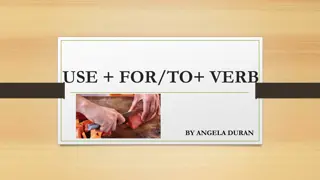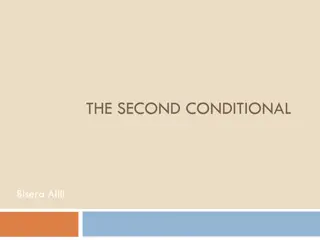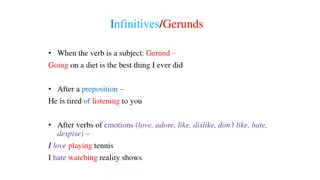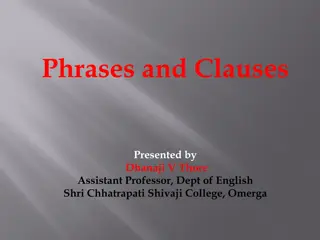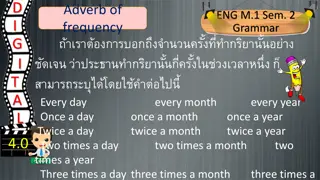The Infinitive vs. Gerund Usage in English
Explore common verbs that are followed by gerunds or infinitives, along with examples and exceptions. Learn when either form can be used, and access resources for practice to improve your understanding of these grammar concepts.
Download Presentation

Please find below an Image/Link to download the presentation.
The content on the website is provided AS IS for your information and personal use only. It may not be sold, licensed, or shared on other websites without obtaining consent from the author.If you encounter any issues during the download, it is possible that the publisher has removed the file from their server.
You are allowed to download the files provided on this website for personal or commercial use, subject to the condition that they are used lawfully. All files are the property of their respective owners.
The content on the website is provided AS IS for your information and personal use only. It may not be sold, licensed, or shared on other websites without obtaining consent from the author.
E N D
Presentation Transcript
The Infinitive vs Gerund Author: Sixten Hinnov
Common verbs which are followed by the GERUND Admit, appreciate, consider, delay, deny, detest (p lgama), end up, enjoy, escape, face, feel like, finish, forgive, give up, imagine, involve, mention, mind, miss, postpone, practise, prefer, put off, remember, recommend, resent, risk, strat, suggest, understand. Example: I m considering asking Jessica to help me.
Common verbs followed by an INFINITIVE Afford, aim, agree, appear, arrange, ask, attempt, be able to, bear, begin, care, choose, consent (n ustuma), decide, determine, expect, fail, forget, happen, hate, hesitate, hope, intend, keen, learn, manage, mean, offer, plan, prefer, prepare, pretend, promise, propose, refuse, remember, seem, start, swear, try, want, wish, (would) like. Example: He asked me to help him.
Common verbs followed by an INFINITIVE WITOUT TO Let, make, hear, help, see, would rather/had better, modals (can, could, shall, should, will, would, must). Example: Her parents won t let her stay out late. NB! In passive sentences make, hear, help are followed by an infinitive with to. Example: He was made to report to the police. Let cannot be used in the passive form. Instead allowed must be used. Example: I am allowed to stay out late by my parents.
These verbs can be followed by either the gerund or the infinitive. Begin, start, like, dislike, hate, love, intend, continue, regret, stop, try. Example: I stopped drinking coffee because it kept me awake at night. We stopped to have a coffee on the way home.
Practise! https://www.eslbuzz.com/verbals- gerunds-infinitives-and-participles/ (Rules) https://www.perfect-english- grammar.com/gerunds-and-infinitives- exercise-2.html https://www.perfect-english- grammar.com/gerunds-and-infinitives- exercise-1.html
References Wyatt R. Newbrook J. Wilson. J. 2008. FCE Gold Plus. Essex: Pearson/Longman. http://inmadom- myenglishclass.blogspot.com.ee/2014/01/ gerund-or-infinitive.html https://www.itefli.com/teflblog/grammar- for-tefl-teachers-gerunds-and-infinitives/ https://englishsecrets.wordpress.com/201 5/01/06/gerund-or-infinitive-i/


